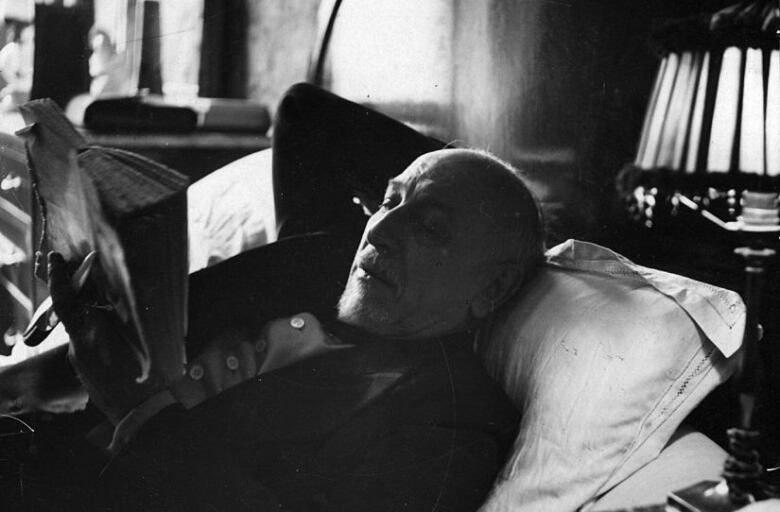100 years on, this Italian play still throws its audiences for a loop
Luigi Pirandello's metatheatrical play provoked such hostility in the audience, he had to escape theatre

*This episode originally aired on May 5, 2021.
The Italian play Six Characters in Search of an Author shocked audiences at its first performance in May 1921.
"They were screaming 'Manicomio! Manicomio!' meaning 'Madhouse! Madhouse!'" said Lisa Sarti, describing the original opening night of the play by Luigi Pirandello. Sarti is co-editor of the journal of the Pirandello Society of America, a journal dedicated to promoting the legacy of the Italian playwright.
"I mean, this author is just crazy. He's out of his mind!"
That first performance at the Teatro Valle in Rome provoked such hostility from some audience members that Pirandello and his daughter had to escape the theatre through a side entrance in order to avoid the angry crowd.
Haunted by six characters
The newest performance is an audio drama version produced by Soulpepper Theatre Company, as part of its Around the World in 80 Plays series.
Six Characters offers an absurd, metatheatrical situation where a theatre company's rehearsal gets interrupted by characters claiming to have been abandoned by their author.

Pirandello explained later that, in a sense, this situation arose directly from his reality as an artist, since he had indeed imagined these six characters, abandoned them, and then found himself haunted by them as a group, even though he did not consider their own drama interesting enough to write.
His own conflict with the rejected characters became the basis for the play. Regardless of its mixed reception on opening night, Six Characters went on to become Pirandello's best-known and most-studied play internationally.
He won the Nobel Prize in Literature in 1934.
"There's lots of mystery in the play. It's also incredibly dark," said Daniele Bartolini, director of the new Soulpepper production.
Bartolini says that the play's conceit initially appears to be some sort of joke but then takes a turn.

Questions around how an individual decides on their own reality, what to prioritize and what to believe, and how to distinguish reality from fiction, mattered greatly in a 1920s Italian society obsessed with self-presentation and increasingly in thrall to Mussolini's Fascist movement. (Pirandello initially professed loyalty to, even enthusiasm for, the Fascists, although he later fell out with them.)
In addition to the historical context, Pirandello's life also revolved around difficulties in communication and the seemingly uncrossable gaps between individual realities.
"He was a very tormented man," said Sarti. "Even his sons, his daughter, his wife, they were struggling, having a real relationship with him in emotional terms because he was always with his characters, you know."
'The work of a genius'
For Bartolini, the appeal of Pirandello's work today is not so much the philosophies behind it or the insights into the human condition it offers. Rather, it's Pirandello's theatrical instinct.
"It's really the work of a genius," Bartolini said of the play's opening 15 minutes, in which an apparently un-prepared theatre space is under construction.
"You're confronted with this, let's say, slap in your face, right in your face, like, "What is going on?" Then you get accustomed to this language that goes on for five minutes of the play within the play, the beginning of the rehearsal. And then the mechanism is broken again when the characters arrive."

Four years after the opening night at Teatro Valle, Pirandello published an essay explaining his intentions with the play.
"Every creature of fantasy and art, in order to exist, must have his drama, that is, a drama in which he may be a character and for which he is a character. This drama is the character's raison d'être, his vital function, necessary for his existence," he wrote.
"I think the true novelty of this play, which is so pure... is not the fact that you find characters that look so alive that they escape the author's control," said Sarti.
"But you have characters who aspire to be alive, and for this, they need the author's fiat. That's the true novelty in the play."
Guests in this episode:
Daniele Bartolini is the artistic director of dopolovore teatrale. He specializes in 'audience-specific' theatre, usually taking place outside of the typical theatre spaces. For instance, in The Stranger, audience members are left alone in a city where they will encounter performers who lead them through an adventure through the cityscape.
Lisa Sarti is an associate professor of Italian studies at the City University of New York, and co-editor of the journal of the Pirandello Society of America.
Find the full production credits for the Soulpepper Theatre Company production here.
* This episode was produced by Tom Howell.

Around The World in 80 Plays is an audio drama series mounted by Soulpepper Theatre Company that takes listeners on a trip around the world. IDEAS will be your guide on that journey with radio documentaries exploring the cultural and historical context from these countries. Find more episodes from this series here.